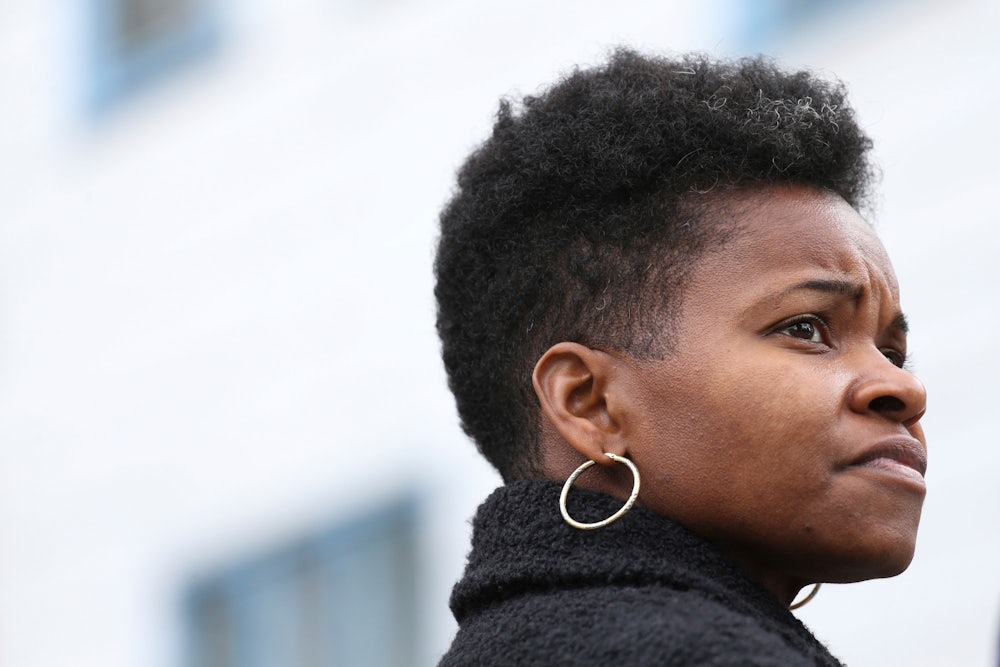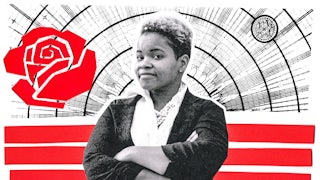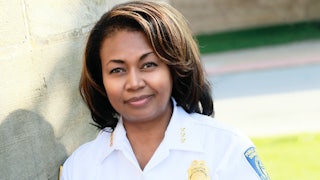When India Walton beat Byron Brown, a deeply complacent four-term incumbent, in Buffalo’s Democratic mayoral primary in June, she came closer than any woman ever has to running the second-largest city in New York. Hers was an inspiring story: Local girl makes good; achieves stunning political upset; brings national, non-blizzard-related attention to her often-overlooked hometown. And she ran the way Democrats have been encouraging first-time candidates to run for years. “If you’re disappointed by your elected officials,” former President Barack Obama said in 2017, “grab a clip board, get some signatures, and run for office yourself.”
Because Buffalo is a deep-blue city, the winner of the Democratic mayoral primary has for decades been elected mayor in the general. Given that Brown was running what appeared at first to be a long-shot write-in campaign to retain his incumbency, many assumed Walton would be next in line. But a funny thing happened on the way to the mayor’s office: Top Democrats, led by Brown, decided that stomping a socialist upstart like Walton was more important than supporting the Democratic ticket—so much so that they were willing to collaborate with Republicans to kneecap their own nominees.
That plan, which involved infusions of cash from wealthy Republican donors, worked. Brown defeated Walton in the general election. But she wasn’t the only casualty. Kim Beaty, the Democratic nominee for Erie County sheriff, will likely narrowly lose to Republican nominee John Garcia, who carried every city and town in the county except for Amherst, Buffalo, and the town of Tonawanda. He currently has 46.5 percent of the vote to Beaty’s 43.9 percent. Given that around 19,000 absentee ballots were requested, that race remains too close to call.
Garcia, who supported Brown, is not a run-of-the-mill Republican. He is the hand-picked successor of outgoing Erie County Sheriff Tim Howard, a notoriously unfeeling and Trump-loving extremist associated with the constitutional sheriffs movement, which asserts that sheriffs have the authority to decide which laws to enforce based on their interpretation of the Constitution. So-called constitutional sheriffs have brutally cracked down on immigrants suspected of entering the country illegally while refusing to enforce gun safety laws and mask mandates. Thirty-one people have died in Erie County jails since Howard’s appointment, most as a result of suicide or medical neglect, and many more have attempted suicide. Brown’s decision to mount a Republican-backed write-in campaign rather than accept the primary results likely juiced Republican turnout in Buffalo, the seat of Erie County, and swung countywide races, including the sheriff’s race, to the right.
Democrats have talked for years about the need to ensure that more women, especially Black women, who are often said to be the party’s backbone, occupy high-level roles within the party. At the same time, a rising cohort of Democratic strategists is spreading the gospel of popularism, which basically means avoiding alienatingly “woke” language and controversial topics like immigration and “defunding” the police, in favor of focusing on things already known to be popular, like jobs and kittens.
These tendencies aren’t necessarily contradictory, and in many ways, Beaty and Walton were poised to meet both standards: Both would have been historic “firsts,” and both avoided incendiary rhetoric on the campaign trail. Walton, in fact, demonstrated a willingness to sing from the popularist hymnal: “I’m not that woke,” she told Ross Barkan in an interview with New York magazine. “If you’re a member of DSA or ultra-progressive, your friends are going to tend to have the same political leanings,” Walton added. “So we use certain terminology when we speak with one another which is not resonant with average working-class folks.”
If elected, each would have been the first woman and the first Black woman to hold her respective office. Beaty would have been Erie County’s first Black sheriff. But as Black women, and Black women Democrats, they were underestimated, misperceived, caricatured, and falsely linked to one another from the start. Both said that Erie County Democratic Chair Jeremy Zellner, who endorsed them after they won their primaries, initially discouraged them from running, reportedly telling Beaty she wasn’t “what a sheriff looks like.” (Zellner has denied saying that.) Walton, who was portrayed as an unhinged radical with criminal associates, never ran on abolishing the police or, as a Brown attack ad alleged, laying off officers en masse. (She did call for cuts to the police budget, which has grown at three times the rate of other city services during Brown’s tenure.) Beaty, too, was misrepresented as having aligned herself with “that new democratic socialist way of running,” in the words of independent sheriff candidate Ted DiNoto, and seeking to “dismantle the pillars of community protection in Erie County,” turning it into “another failed socialist public safety experiment,” per a particularly mendacious Garcia ad.
The perception and portrayal of Beaty and Walton was reminiscent of the kerfuffle over a 2008 New Yorker cover meant to spoof right-wing lies about the Obamas. Thanks to right-wing propaganda and racist stereotypes, some people hear an angry Black radical no matter who a Black woman is or what she is saying; others see “Democrat” and think “socialist.”
But although both women faced racism and sexism within their own party, the electorate at large, and local media, Beaty was reluctant to associate with Walton, whom she perceived, perhaps correctly, as potentially alienating to other voters she needed to win. Beaty and Walton also differed in background, ideology, and temperament. Beaty served as deputy commissioner of the Buffalo Police Department under Brown and once appeared in a 2013 Brown campaign ad that came under fire for allegedly violating election law by featuring a uniformed police officer. (In 2021, 139 people filed a complaint with Buffalo’s Board of Ethics asserting that a Brown ad featuring police officers violated election law.) Walton is a democratic socialist and community organizer who criticized Brown for years before running against him.
Beaty was so afraid of antagonizing her vindictive former boss and his supporters that she avoided encouraging her own supporters to vote on the Democratic line, which would have meant supporting Walton, too. Her loyalty to the mayor went unreciprocated. Brown never endorsed her. In its own notably tepid Beaty endorsement, The Buffalo News wrote that it was “uncertain” how well Beaty had performed in her old job as deputy commissioner of the police department, declaring it “worrisome” that Brown, her former boss, had not endorsed her for sheriff.
That the News saw Brown’s snub as a sign that Beaty was in some way lacking is both sexist and absurd, given Brown’s history of undermining fellow Democrats. Some believe Brown withheld vital support from Bernie Tolbert, a Black male Democrat who ran for sheriff in 2017 and nearly defeated Howard, because he disliked Tolbert for challenging him in the 2013 mayoral primary. Tolbert lost the 2017 sheriff’s race by around 3,800 votes.
Brown courted not just everyday GOP voters but the most powerful and least scrupulous GOP officials in the state. He declared in June that he “did not seek, nor will accept in any form” support from Carl Paladino, a particularly noxious Buffalo Republican and real estate developer who ran for governor of New York in 2010 and has since been best known for making racist remarks about Michelle Obama, whom he said he would like to see “let loose in the outback of Zimbabwe … in a cave with Maxie, the gorilla.” Yet Paladino reportedly spoke with Brown by telephone shortly after he lost the primary, encouraging him to remain in the race, and urged other Buffalo business leaders to support him. The two men have a mutually beneficial relationship dating back at least to 2013, when Paladino attended a fundraiser for Brown. And Brown has supported many Paladino development projects throughout his tenure as mayor. As recently as late October, companies with direct ties to Paladino gave Brown’s campaign $10,000.
Despite the fact that Brown ran the State Democratic Committee from 2016 to 2019, he wasn’t too proud to accept help from the State Republican Committee in his 2021 bid for mayor. New York Republicans sent mailers on Brown’s behalf claiming that Walton embraced a “radical agenda” that would “destroy Buffalo.” The mailers falsely claimed that Walton, who has said she is a rape survivor, would champion a “no jail policy” for rapists. One of the first people to congratulate Brown on election night—tweeting, “Congratulations, Mayor Byron Brown. Socialism has been defeated in Buffalo!”—was Nick Langworthy, the chair of the State Republican Committee. When Langworthy was chair of the Erie County GOP in 2010, he endorsed Paladino for governor. In 2016, he served on Trump’s transition team.
Nearly as disturbing as Brown’s sleazy collusion with his supposed ideological enemies was the local press’s feigned or actual ignorance of what was clearly unfolding. Despite years of reporting on Brown’s connections to Paladino, much of it from The Buffalo News, veteran Buffalo News political reporter Bob McCarthy downplayed them in an October 26 appearance on WNYC’s Brian Lehrer Show. Referring to Brown, Lehrer said, “He’s welcoming Carl Paladino support at the very least, it sounds like.” “No, that’s not true,” McCarthy responded. “The mayor has not accepted Carl Paladino’s support and, as a matter of fact, rejected it.” Following up, Lehrer said, “There’s Carl Paladino money in his campaign. Is that what you’re saying?” McCarthy replied, “I’m not aware of that. I don’t know. I’d have to check that.”
It’s clear that Republicans both aided and celebrated Brown’s triumph in the general election, and equally clear that most high-ranking New York Democratic officials did nothing to help Walton or actively supported Brown. Jay Jacobs, the chair of the State Democratic Committee, not only refused to endorse Walton but likened her to David Duke, the former grand wizard of the Ku Klux Klan. New York Governor Kathy Hochul, who is from Buffalo, refused to endorse Walton and endorsed Beaty just three days before the election. New York State Assembly Majority Leader Crystal Peoples-Stokes, a Black woman from Buffalo and the first woman in the state’s history to hold the position of Assembly majority leader, endorsed Brown.
“Rather than lay out a positive vision for the future, Brown and his GOP backers ran a negative, sexist, and smear-filled campaign that fueled right-wing turnout,” Ravi Mangla, a spokesperson for the New York Working Families Party, told me in an email. “Democratic leaders who supported Byron Brown’s write-in campaign, or stood passively on the sidelines, bear responsibility for the outcomes we see on the county level.” That top Democrats were willing to collaborate with Republicans—including active Trump supporters—or ignore their involvement in the mayor’s race, withhold support from Democratic primary-winners, and tacitly authorize dishonest and possibly illegal ad campaigns to crush their own party’s mayoral nominee is bad enough. That in doing so they may also have helped defeat Beaty, a Black woman who ran on bringing modest reforms to a deadly sheriff’s office, is unforgivable.






